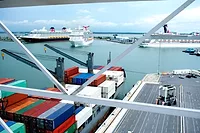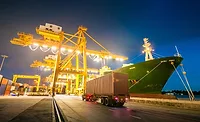DHS Needs More Port Security for Opioid Problem
The Homeland Security Department needs thousands of additional port officers to help stymie the flow of illicit opioids into the country.
The Senate Homeland Security and Governmental Affairs Committee said in a report that CBP Officers at ports of entry (Port Officers) play a key role in stopping opioids and that CBP has significant shortages of Port Officers that may be compromising efforts to seize additional opioids before they can reach U.S. communities.
Key findings of the report include:
- The vast majority of all opioids interdicted by CBP are seized at ports of entry. Between 2013 and 2017, approximately 25,405 pounds, or 88% of all opioids seized by CBP, were seized at ports of entry. Ports of entry located along the southern border are most active as those seizures accounted for 75% of all opioids seized at ports of entry during the same five year period.
- Fentanyl seizures are rapidly increasing, and most occur at ports of entry. In a single year, the amount of fentanyl seized by CBP more than doubled, from 564 pounds in 2016 to 1,370 pounds in 2017. 85% of all CBP fentanyl seizures took place at ports of entry.
- Large shipments of fentanyl entering the United States are seized at the ports of entry on the southern border, while a greater number of small shipments are interdicted in the international mail. Officers at ports of entry on the southern border seized 75% of the total poundage of fentanyl seized across all ports of entry between 2016 and 2017. Port Officers at international mail facilities had more than five times as many fentanyl seizures at mail facilities as Port Officers at land ports of entry.
- Both mail and express carrier fentanyl seizures have increased over the past two years. When fentanyl is delivered through the international mail, a greater number of small shipments are sent through the U.S. Postal Service and larger amounts are shipped though express carriers like UPS, DHL, and Fed Ex. Although CBP depends on package data provided by express shippers in order to target packages likely to contain opioids and contraband, this information can be incomplete. While CBP has the authority to issue fines to compel shippers to provide complete data, express shippers have successfully negotiated $26 million in such penalties between 2014 and 2016 down to just $4 million.
- Staffing shortages at ports of entry may be compromising interdiction efforts. Ports of entry across the United States have 4,000 Port Officers less than the number needed to staff all ports of entry. Ports of entry in the San Diego and Tucson areas, which together accounted for 57% of all opioid seizures by Port Officers between 2016 and 2017, have required CBP to assign temporary staff details to fulfill staffing needs at those locations. The practice of temporary details has become so systemic over the past two fiscal years that CBP has named it “Operation Overflow.”
- The opioid epidemic places disproportionate demands on Port Officers relative to other border security law enforcement officers. In its proposed FY 2019 budget, the Administration proposes to dramatically increase staffing at Border Patrol and Immigration and Customs Enforcement, but add no additional officers at ports of entry. This prioritization of other border security enforcement components over Office of Field Operations ignores the important role that Port Officers play in stemming the opioid crisis.
According to the report, "Port Officers are, in the majority of cases, the last line of defense in preventing illicit opioids from entering the United States. To help stem the opioid crisis, increasing resources and staffing at ports of entry is critical. On February 15, 2018, Ranking Member McCaskill introduced The Border and Port Security Act, a bill that would authorize CBP to hire an additional 500 Port Officers each year until they meet the goals calculated in their workload staffing model. This legislation is a critical step in providing ports of entry with the resources they need to stop opioids before they can reach communities across the United States."
Looking for a reprint of this article?
From high-res PDFs to custom plaques, order your copy today!







